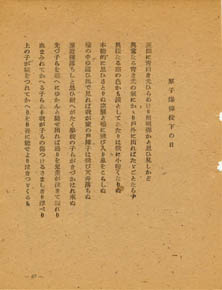THE DAY OF THE ATOMIC BOMBby Kurihara Sadako

Gordon W. Prange Collection, University of Maryland Libraries Site Ed. note: This poem was written in the tanka format sometime before July 1946. Although American censors decided to pass the poem in its entirety, Kurihara deleted the last five tanka on her own. In the field out back, a bluish-white flash; thinking to myself, "A flare," I look out. Uneasy about the weird blue flash, I step outside— something is very wrong. The sky is a strange hue— hazy; suddenly it's almost dusk. Acting on instinct— air raid!— I race to our trench, and hold my breath. Crawling out of the shelter, I find doors and shoji blown off and ceiling down. Must have been a near miss, and the children at school; I become anxious, Unbearably so. Go get them! Rushing out, I find children on the street, coming home crying. Some are all bloody; in my mind's eye I keep seeing my own children injured. They come home, the older leading the younger by hand; they run to me, still crying. Children! Children! You're all right! I take them firmly by the hand and squeeze hard. "I'll never let you out of my sight!" My love for them swells enormously. A bizarre stormcloud rising to a peak: the children are scared and stay close by me. Thunder rolls like the roar of a plane; the children are terrified. (The atomic bomb exploded at 8:30 A.M.; by 10:A.M. refugees were fleeing to the suburbs in one continuous stream.) Author's note: "The last five tanka passed prepublication censorship [1946], but I eliminated them from the first edition. On 5 August, the day before the atomic bomb fell, I had been mobilized to clear firebreaks in Tenjin-cho, ground zero. On the morning of 6 August, I saw my husband off to the Mitsubishi Precision Machine factory in Gion where we lived and the two children off to school. Then, as I was cleaning up in the kitchen, I saw the flash. I was four kilometers (two and a half miles) from ground zero." Frightening street of hell— each moment the number of refugees grows. The refugees all Have burns; clothes are seared onto skin. Uninjured but utterly naked, a young girl fleeing- I give her my child's underpants. The road to the aid station outside of town: the line of refugees stretches on and on. On the relief trucks, The bodies of the dead And the injured, blistered and horrible. ......................... ReferenceKurihara Sadako. Black Eggs: Poems. Trans. Richard H. Minear. Ann Arbor, Michigan: University of Michigan, Center for Japanese Studies, 1994, 82-85.
|